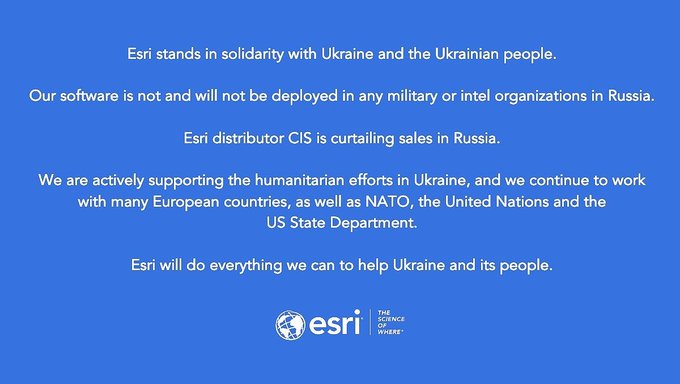
This is going to be a brain dump, I don’t know if it will make any sense!
I have been an evangelist for open source software for a decade or longer and I sincerely believe that the open source model offers a strong alternative to proprietary software, particularly for public sector and even more so in recent years as we have seen an accelerated move to the cloud. This is not going to be another piece on why open source is better than proprietary or what are the weaknesses of one model or the other. I just needed to get that out of the way.
I am writing this as we enter the third week of Russia’s invasion of Ukraine. Several high profile companies have closed their operations in Russia either as a temporary response to the invasion or in the case of the UK oil companies announced their intention to divest of their Russian investments. Big Tech is stepping back from Russia as fast as it can and smaller companies are following suit. This may be a genuine case of “doing the right thing” or it may be bowing to the inevitable, regardless of what we think of their motives we surely prefer this response to sitting on their hands and pretending some faux neutrality as we have seen on occasions in the recent past. We might laugh at Google’s “Do no evil” and point to the numerous failures on that count but it is a laudable aspiration.
I have presented on the tense community dynamics within our geo-space in my talk “Open Communities – we love to hate” and I questioned the belief within the open source community that we are on the side of the angels and that proprietary software is not.
In our little geospace Big Tech = Esri, so inevitably they are a big target for criticism but I wonder if some on “my side” are indulging in some virtue signalling in their critique of Esri’s recent statement re the supply of their products to Russia and Belarus

Esri have also claimed that they have not supplied the Russian military

Quite a few people have suggested that the statements are not strong enough or are carefully worded to give a positive impression without saying much. Maybe, but I am not sure what Esri could say or do that would make people happy, if you have provided software and services to the Russian government in the past then it probably isn’t possibly to just pull the plug on those systems.
Meanwhile, there is nothing on the QGIS or GeoServer sites to prevent their software being downloaded by Russian organisations. On a broader level, I would hazard a guess that most of the cyber warriors working for the Russian side hacking and misinforming are using open source platforms rather than Windows 11!
Do we want software businesses deciding who may use their software? Or is it the responsibility of governments to decide who companies can sell to? Most countries have strict controls on the sale of technology with military or security applications and clearly that should include GI. Esri is a multi billion dollar US tech corp, their largest customer is the US government, I would guess that their past sales to Russia had US government approval and their recent cessation of sales will also have followed US guidelines. But what about open source, can government or anyone control where and how open source software is deployed? At this moment I would say “unfortunately not” however in the long term government may have to play a role in determining how and where open source software, which is often partly funded by government, can be deployed.
You know what? If you believe that software providers should have some retrospective ability/obligation to switch off service to todays’s bad actors, then those pesky license servers with their “kill switches” start to look like an attractive proposition! And that is not an open source model.
Not sure any of this has made a lot of sense, final thought:
Regardless of the commercial model software engineers create products and services to solve problems and fulfil needs. We don’t always foresee all of the ways software will be used and we may have to wrestle with the problems that we have created, you could call that The Rutherford Conundrum. There will be a time to learn from recent events and maybe to make changes, now is a time to support the people in Ukraine in any way we can.



